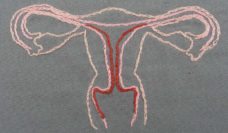There are three arguments against induced abortion. The first argues that a full human life begins at the point an egg is fertilized by a sperm; therefore, abortion is a violation of human rights. In the Christian tradition, this argument is commonly articulated through a religious belief in a deeply personal relationship with God who has foreseen every aspect of our individual lives. Within this philosophy are varying degrees of provision for women whose health is threatened by carrying a pregnancy to term.
The second argues that induced abortion should not be needed in a just society. Most pithily summed in the talking point that abortion should be “safe, legal, and rare,” this line of thinking envisions a world with extremely high levels of health and well-being. In such a world, in which women would not face reproductive coercion or sexual assault, in which everyone would have excellent health and healthcare, in which no families lived in poverty, all pregnancies would be wanted. Abortion would occur in rare cases of medical necessity.
And then there is a third argument, which is a scientific claim that induced abortion harms women’s health. This is a line of reasoning that has emerged as state legislators increasingly seek to enact laws to regulate the provision of abortion. Unlike the first two arguments, which are moral arguments, this third argument is an empirical one. The problem is that it is not grounded in fact.
The most rigorous research on the question of the effects of obtaining an induced abortion on women’s health has been conducted by Diana Greene Foster and colleagues as part of the Turnaway Study. This study design took advantage of the gestational age limit for women seeking an abortion. Researchers followed three groups of women: those who obtained an abortion just before the gestational age limit, those who presented just after the gestational age limit and were turned away, and a group of women who obtained an abortion early in pregnancy. The importance of this study design is the comparability of the groups of women followed, which allows for an “apples to apples” comparison. In the more than two dozen publications from this study, researchers have found no evidence that obtaining an abortion leads to depression or post-traumatic stress disorder, substance use disorders or binge drinking, or increased stress levels.
I recently conducted a study of state Medicaid coverage of medically necessary abortion — i.e., cases in which a doctor determines that an induced abortion is needed to protect a woman’s physical or mental health. My colleagues and I compared the risk of severe maternal morbidity and maternal mortality in the 17 states with Medicaid coverage of medically necessary abortion and in the other states that only cover abortion in the case of rape, incest, or life endangerment. We found an average 15% reduced risk of severe maternal morbidity in states with Medicaid coverage of medically necessary abortion; but interestingly, similar risk reductions were seen among women with Medicaid and with private insurance. We found no risk reduction in maternal mortality. Such findings are consistent with the Turnaway research, and together the research supports the hypothesis that induced abortion does not harm women’s health.
These findings, however, will not be entirely satisfying to political operatives on either side of the abortion wars. Anti-abortion advocates would have expected induced abortion to carry great health risks, and abortion-rights advocates would have expected induced abortion to lead to health benefits. That is, perhaps, what gives this empirical research its credibility: findings reflect the reality that women live in environments with multiple, interacting protective and risk factors, and that having an abortion or having a baby is only one event in a lifetime of reproductive health.
Which leaves us with the question of why it is that so much un-scientific medical guidance is being codified into state statutes. Six state laws require that women seeking an abortion be counseled that induced abortion may result in adverse mental health effects, four require counseling that induced abortion reduces future fertility, and five states mandate counseling that induced abortion increases the risk of breast cancer. None of these claims are supported by peer-reviewed research.
Instead of making a moral argument to women, these laws are requiring providers to make fake scientific arguments to women.
Instead of making a moral argument to women, these laws are requiring providers to make fake scientific arguments to women . It’s not clear that state lawmakers even believe the claims that they are mandating as part of patient counseling. Tellingly, these counseling requirements are not enforceable after a woman has a spontaneous abortion. If policymakers really believed that such risks existed, wouldn’t they want women who have had a spontaneous abortion to receive follow-up screenings for mental health and breast cancer?
Perhaps religious groups believe that rational and moral arguments have become ineffective (and they might be right), and dubious claims are an acceptable means to an end. Perhaps the “safe, legal, and rare” argument has become as outmoded as Bill Clinton’s New Democrat brand. Perhaps this debate is further evidence of the erosion of democracy that is made manifest through the absence of truth.
Others have written more eloquently than I about the fraught politics of abortion. But fundamentally, many women have deeply ambivalent feelings about induced abortion. We carry the history, often a personal history, of reproductive coercion or outright brutality. We know that choice must not slide into coercion. With conservative Republicans, who promise outright bans of abortion in nearly all cases, in full control of the U.S. government and many state governments, there is an opening for a conversation, an honest conversation, about what that means and about what research might tell us. We just can’t hear each other in the cacophony.
Feature image: Charlotte Cooper, Reproductive Justice for All, Planned Parenthood Rally, NYC 2011, used under CC BY 2.0














